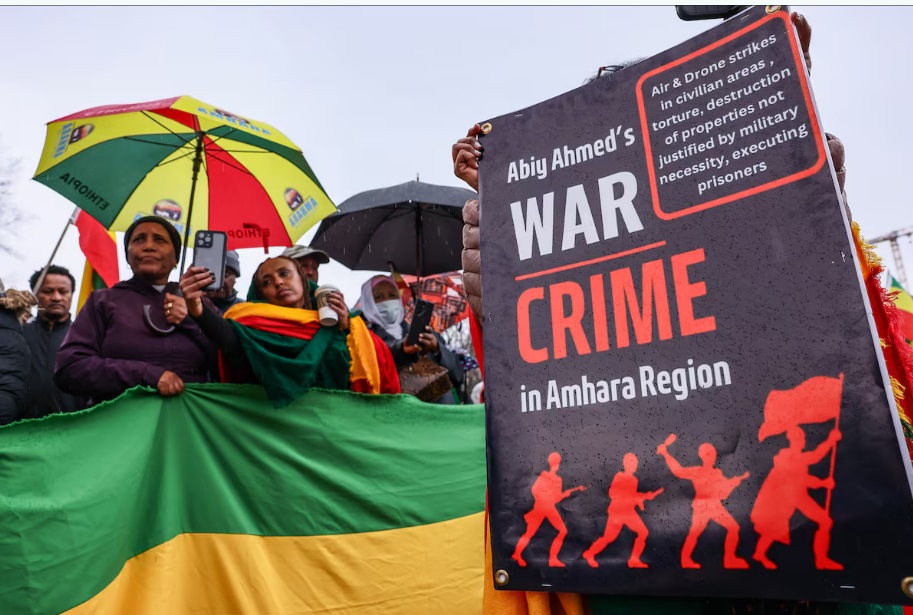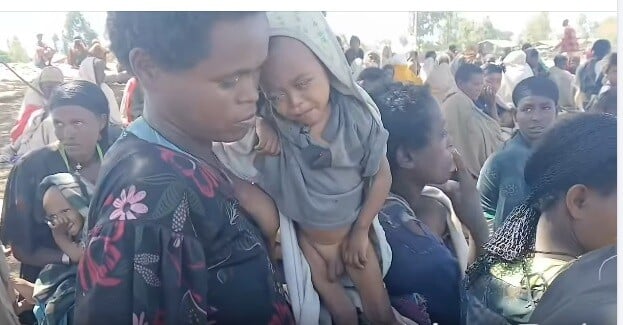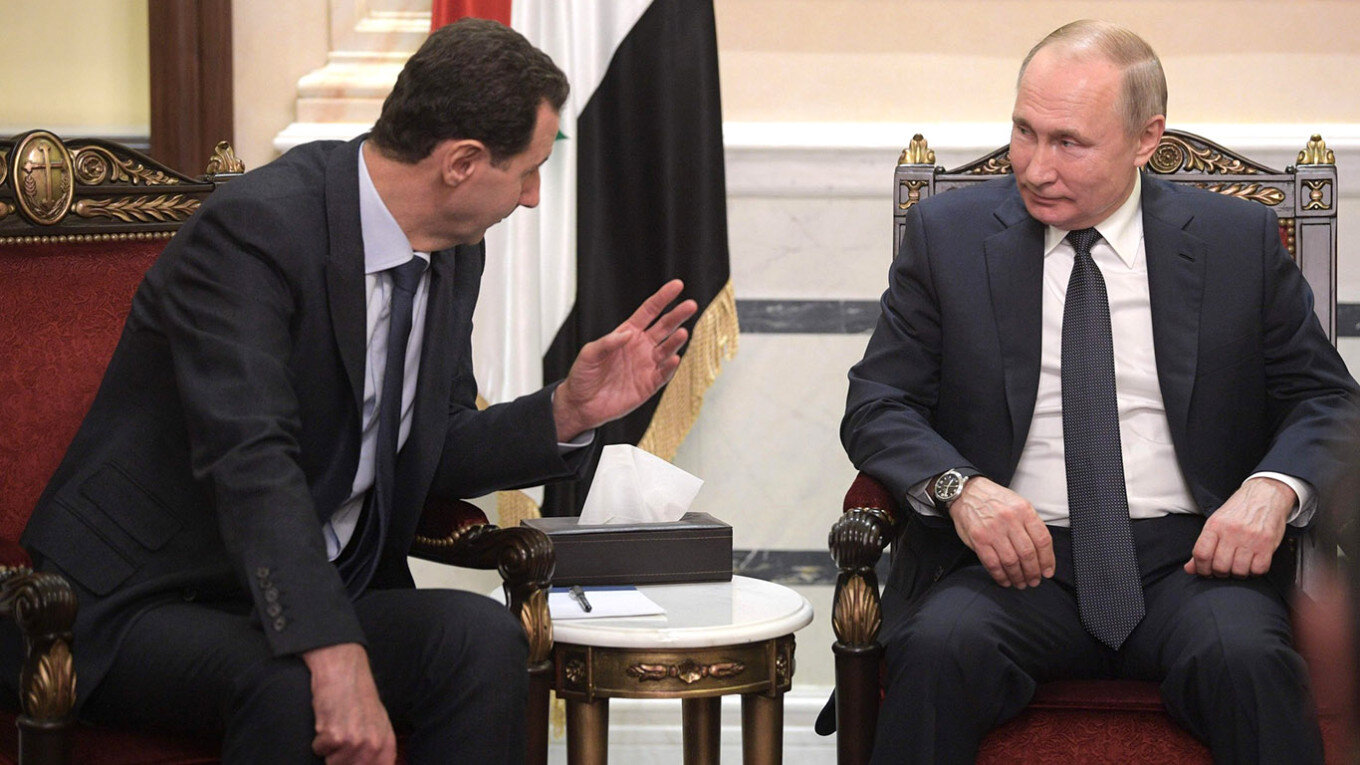Washington Update – by Mesfin Mekonen
August 1, 2023
1. Ethiopian Town Hall meeting:
Over 400 Ethiopian-Americans attended a Town Hall meeting in Silver Spring, MD on July 30 to express support for the Amhara Popular Front, which was founded by Eskinder Nega, an civil society leader and journalist who is promoting human rights and democracy. Participants discussed their outrage over human rights abuses in Ethiopia. Eskinder Nega sent a message to the audience from Ethiopia.
A support group for the Amhara Popular Front in North America organized the event. Its chairman, Major Dawit Woldegiorgis, joined other speakers in warning Ethiopians that they must organize peacefully and work to defend and alleviate the suffering of the Amhara people. They all agreed that the human rights situation is getting worse, and the Amhara must defend themself to stop the violence and repression before it is too late. They also denounced the Abiy government’s detention of many Ethiopians of Amhara origin, including members of the Fano, patriots, journalists, professors, and peaceful activists. They must all be released. All of the speakers said that the Abiy government has not made any attempts to hold the perpetrators of the massacres of the Amhara people accountable for their actions, nor has it acted against the OLF/Shenne group, which has committed atrocities and destroyed property in many parts of Ethiopia including Wollega province. Major Dawit answered questions from audience regarding outreach out other Amhara organizations, saying that the Amhara Poplar Front is communicating with all other Amhara organizations to join the struggle.
2, Biden administration goes into reverse
The Biden administration notified Congress in late June that the Ethiopian government is no longer engaging in a “pattern of gross violations of human rights,” allowing the country to once more qualify for U.S. and international loans and other financial assistance. The about face comes three months after Secretary of State Antony Blinken determined that all warring parties to the conflict in Ethiopia had “committed war crimes,” and that the Ethiopian National Defense Forces (ENDF) and two other forces had “also committed crimes against humanity, including murder, rape and other forms of sexual violence, and persecution.” U.S. Ambassador to the United Nations Linda Thomas-Greenfield said in October that, in two years of violence, “as many as half a million” people had been killed.
In fact, the human rights situation in Ethiopia has not improved. Fighting continues in the Amhara region. There are high rates of casualties among civilians and the public, forced dislocations. Serious human rights violations against civilians have also been ongoing in the Amhara region, and have continued since 2019 in the Oromia region. By making contradictory statements about human rights violations, the U.S. government is losing credibility, according to Human Rights Watch. The organization has documented numerous instances of the U.S. government prematurely announcing that governments have stopped committing atrocities.
3, Rep. Chris Smith on the atrocities in Ethiopia
Last year as reminder Rep. Chris Smith (R-NJ), Ranking Member of the House Foreign Affairs Subcommittee on Africa and Co-Chair of the Tom Lantos Human Rights Commission, issued a statement confirmed reports of the slaughter of over 400 ethnic Amhara by the Oromo People’s Liberation Army last year in the Oromia region of Ethiopia still continues: “Ethnic-based violence in Ethiopia must stop. We cannot scapegoat one group as each group has both victims and victimizers. The bloodshed must end—and those who commit atrocities must be held to account, including government forces as well as ethnic militias. The cycle of recrimination must be broken.”
4, Food situation
The U.S. decision to absolve the Ethiopian government comes just a few months after revelations that the government was complicit in a large-scale crime. Ethiopian government officials participated in the largest known theft of food assistance, crimes that literally took food out of the mouths of starving people and lined the pockets of corrupt members of the government and their allies.
Russia’s cynical decision to withdraw from the Black Sea grain agreement will harm Ethiopians. Prices of wheat will increase and the amount of assistance that international aid organizations will be able to provide will decrease. This squeeze could not come at a worse time as climate change is diminishing harvests in Ethiopia.
5, Grand Ethiopian Renaissance Dam
Associated Press reported on July 13 that after years of failed talks, Ethiopia and Egypt announced that they “aim to finalize within four months an agreement on the operations of Africa’s largest dam.” AP added: “The new statement does not describe the foreseen agreement as a legally binding one, which Egypt and Sudan have sought. It also doesn’t say whether the talks will be under the auspices of the African Union, which Ethiopia has preferred.”
The GERD is essential for Ethiopia’s prosperity, both for irrigation that is critical to creating food self sufficiency and for the generation of electricity that will make economic development possible.


















My concern also includes some sort of a different nature. In regards to the current disturbance going on in Amhara region my hope is level heads will prevail and the region will regain peace and stability. My other concern is what will or may happen in the capital that will trigger a political tremor shaking up the whole country as it known today and for worse. You see we the generation of the 1960’s were used to hearing about one change of government after another in the then newly independent countries of Africa. Almost all of them were coup d’é•tat’s usually carried by corporals and 2nd lieutenants. It was like a pandemic spreading like Covid-19 of these days. There were some exceptions like Senegal, Botswana, Kenya, Tanzania and Morocco. Majority of those coups were very violent and deadly to the sitting(overthrown) leaders. King Farouq of Egypt was very lucky that his overthrow did not happen in the 1960’s. But most of us used to think coup d’é•tat will never happen to the late emperor. Even though his undoing began with the widespread upheaval but the final straw was a gang of military officers who hauled him away in a Volkswagen Beetle and savagely bludgeoned him to death while in custody. One of my countrymen friends who was in the capital when the late emperor was taken into custody told me many students in the capital including himself took to the streets supporting the action of conniving officers not knowing or foreseeing what was afoot for them at a later date. These days we hear one overthrow of a ruling civilian government after another in that continent with a mysterious military officer appearing on the national TV telling his citizens the leader they elected with hard won voting right is no more. The new sheriff in town tells them ‘L’État, c’est moi’, all roads of governing lead to him! Just bear that in mind.